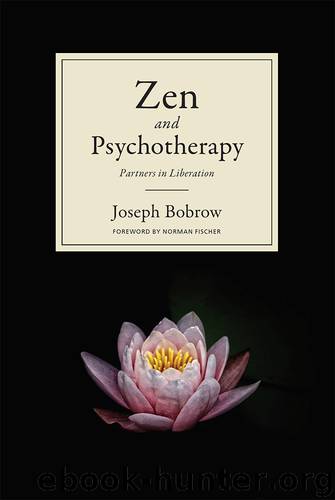Zen and Psychotherapy by Joseph Bobrow

Author:Joseph Bobrow
Language: eng
Format: epub
Publisher: Wisdom Publications
CHAPTER 6
Knowing the Truth
And you shall know the truth and the truth shall set you free.
— JOHN, 8:32
Not the intense moment
Isolated, with no before and after,
But a lifetime burning in every moment
— T. S. ELIOT, “EAST COKER”
In a wildly popular song, Tina Turner belts out the lyrics: “What’s love got to do, got to do with it? What’s love but a secondhand emotion?” In our postmodern mindset, could we not say the same for the notion of truth in psychotherapy? Don’t we know that it is constructed, not discovered, negotiated rather than interpreted? Why raise an old warhorse from the scrap heap?
The ideas in this chapter developed from working with several psychotherapy patients. They also emerged from an ongoing effort to integrate, within my own thinking and practice, 35 years of practicing psychotherapy and Zen Buddhism. I hope they can provide a lens for looking at the experience of doing psychotherapy, and I hope they will add an important element that, in addition to unconscious emotional communication in the relational field, contributes to the Zen ideal of dhyana (attentive practice), prajna (wisdom), and sila (awakened action) coming into alignment. I have discussed how any experience can be put at the service of aims other than the intended ones. “Turning toward truth,” conscious and unconscious, can play a part.
In the film Billy Elliot, Billy’s father is a stern, bitter, and hard man, a miner, from whom Billy hides his interest in ballet. Somehow, despite himself, the father softens and ends up taking Billy to class. On the way, he is confronted by his elder son, who is identified with the father and their shared struggles for economic justice. Sensing a powerful, betraying turnaround, this son implores and begs his father not to go. The father exclaims: “He’s only just a kid!” The transformation reflected in his words astounds us. We know, of course, that Billy is a kid. It is obvious. But, father and the viewer together realize this ordinary truth for the first time. Michael Parsons captures this in the title of his paper, “Suddenly Finding It Really Matters.” He describes an analysis with a woman who brought them both “rather sharply against the realization that distinguishing fantasy from reality really matters.” This is a truth every therapist knows. But, their work together made him realize it for the first time. In Zen, too, it is the ordinary, not the extraordinarily mystical, that astounds, viewed from a new perspective, the scales fallen from the eyes. This is captured in a dialogue from the film. Billy and his father are riding in the bus on the way to London for the ballet competition. Billy asks: “So, how’s London?” “Dunno,” says his father. “Why?” continues Billy. “Never been,” father replies, “no mines there.” Billy says, “Is that all you think about?” Trapped in the tunnel vision that comes from the overdetermined habit of seeing only that which is “mine,” not only did the father not know London, he could not recognize Billy’s distinctive humanity.
Download
This site does not store any files on its server. We only index and link to content provided by other sites. Please contact the content providers to delete copyright contents if any and email us, we'll remove relevant links or contents immediately.
Rewire Your Anxious Brain by Catherine M. Pittman(17581)
Talking to Strangers by Malcolm Gladwell(11862)
The Art of Thinking Clearly by Rolf Dobelli(8836)
Mindhunter: Inside the FBI's Elite Serial Crime Unit by John E. Douglas & Mark Olshaker(7829)
Becoming Supernatural by Dr. Joe Dispenza(7099)
Change Your Questions, Change Your Life by Marilee Adams(6637)
Nudge - Improving Decisions about Health, Wealth, and Happiness by Thaler Sunstein(6629)
The Road Less Traveled by M. Scott Peck(6627)
The Lost Art of Listening by Michael P. Nichols(6463)
Enlightenment Now: The Case for Reason, Science, Humanism, and Progress by Steven Pinker(6403)
Win Bigly by Scott Adams(6306)
Mastermind: How to Think Like Sherlock Holmes by Maria Konnikova(6225)
The Way of Zen by Alan W. Watts(5790)
Daring Greatly by Brene Brown(5636)
Grit by Angela Duckworth(4728)
Big Magic: Creative Living Beyond Fear by Elizabeth Gilbert(4718)
Men In Love by Nancy Friday(4315)
Flow by Mihaly Csikszentmihalyi(4047)
The Four Tendencies by Gretchen Rubin(4018)
